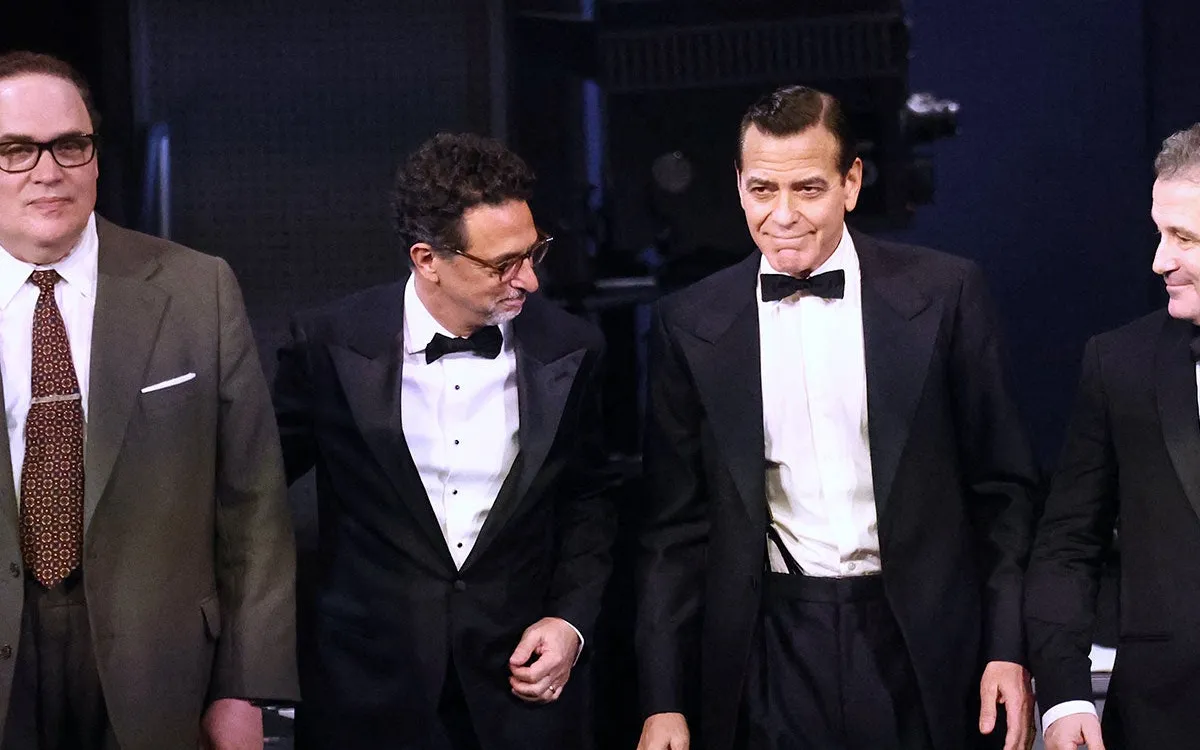
The biggest sensation on Broadway isn’t a dazzling musical or a popular show like Stranger Things. Instead, it's a thought-provoking straight play titled Good Night, and Good Luck, which delves into the history of television news. This production, featuring the star power of George Clooney, has captivated audiences and achieved remarkable success. With only a handful of performances left, including a matinee just hours before the Tony Awards where it is nominated for five prestigious awards, the play is breaking records, amassing an astonishing $4.2 million in box office sales in just one week.
This season, high-profile productions have driven ticket prices to unprecedented heights, with prime seats for Denzel Washington and Jake Gyllenhaal's rendition of Othello reaching nearly $1,000. Prior to this, the record was held by Harry Potter and the Cursed Child at $2.7 million. However, Good Night, and Good Luck offers a different experience, focusing on a serious exploration of journalistic ethics rather than theatrical pyrotechnics.
The play is a literal morality tale centered around the legendary newsman Edward R. Murrow, who stands before the audience at a lectern, embodying the weight of his profession. Each week, the Winter Garden Theatre, once home to Cats, is filled with enthusiastic applause for this sobering examination of the press's responsibilities. Although Good Night, and Good Luck is derived from a pre-existing property, its source material—a 2005 film that received six Academy Award nominations but won none—was not a blockbuster hit. Clooney, who directed and co-wrote the original screenplay, felt the time was ripe to reiterate its vital message about the importance of a courageous press, especially in an era rife with misinformation.
The adaptation closely follows the movie's structure, highlighting Murrow's televised confrontations with the red-baiting Senator Joseph McCarthy. Under the direction of David Cromer, the stage version has evolved into a genuine theatrical spectacle, featuring a cast of nearly twenty, a jazz band elevated above the stage, and an auditorium filled with monitors displaying Murrow's CBS broadcasts. Yet, it is not solely the production elements that draw audiences; the allure of Clooney and the sense of community among attendees who share similar concerns about the world is a significant factor.
The Winter Garden Theatre can accommodate only 1,500 patrons each night, and the limited run of the play further restricts its reach. However, Clooney and his team have devised a plan to extend Good Night, and Good Luck’s audience by broadcasting its penultimate performance live on CNN and streaming it simultaneously on Max and CNN's website. This groundbreaking event marks the first time a Broadway play will be televised, harkening back to an era when television broadcasts were live and fraught with risk.
In his famed "Wires and Lights in a Box" speech, Murrow refers to television as an "instrument" of immense power, capable of enlightening or misleading. His concerns extend beyond the dangers of misinformation to the absence of accurate information. A standout word in his speech is "insulate." Clooney, portraying Murrow, warns that if television serves only to entertain, the struggle for truth is lost.
While Good Night, and Good Luck is vibrant in color, it presents a stark dichotomy between information and entertainment. The play critiques Murrow's hosting of Person to Person, a show that used emerging technology to interview celebrities, framing it as a compromise of his journalistic integrity. Murrow's speech envisions a future where prime-time variety shows yield to meaningful news broadcasts, a stark contrast to the fragmented media landscape of today.
Despite the play's theatrical indulgences, it remains committed to Murrow’s serious message about the media's responsibilities. Clooney's performance highlights Murrow’s skilled use of television to convey moral seriousness, a quality that resonates with audiences. The play serves as a medium for contemporary viewers to engage with historical footage, including Murrow's impactful reports on McCarthy and the individuals affected by his hysteria.
The narrative of Good Night, and Good Luck serves as a reminder of the ongoing struggles within the media industry. Clooney and Heslov's production emphasizes the importance of making informed choices about media consumption and the consequences of neglecting this responsibility. As the pressures on the news industry continue to grow, the urgent call for a courageous and uncompromising press remains as relevant today as it was during Murrow's time.